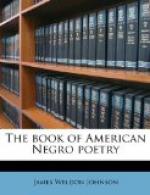The fact is fairly well known that the father of Dumas was a Negro of the French West Indies, and that the father of Coleridge-Taylor was a native-born African; but the facts concerning Pushkin’s African ancestry are not so familiar.
When Peter the Great was Czar of Russia, some potentate presented him with a full-blooded Negro of gigantic size. Peter, the most eccentric ruler of modern times, dressed this Negro up in soldier clothes, christened him Hannibal, and made him a special body-guard.
But Hannibal had more than size, he had brain and ability. He not only looked picturesque and imposing in soldier clothes, he showed that he had in him the making of a real soldier. Peter recognized this, and eventually made him a general. He afterwards ennobled him, and Hannibal, later, married one of the ladies of the Russian court. This same Hannibal was great-grandfather of Pushkin, the national poet of Russia, the man who bears the same relation to Russian literature that Shakespeare bears to English literature.
I know the question naturally arises: If out of the few Negroes who have lived in France there came a Dumas; and out of the few Negroes who have lived in England there came a Coleridge-Taylor; and if from the man who was at the time, probably, the only Negro in Russia there sprang that country’s national poet, why have not the millions of Negroes in the United States with all the emotional and artistic endowment claimed for them produced a Dumas, or a Coleridge-Taylor, or a Pushkin?
The question seems difficult, but there is an answer. The Negro in the United States is consuming all of his intellectual energy in this gruelling race-struggle. And the same statement may be made in a general way about the white South. Why does not the white South produce literature and art? The white South, too, is consuming all of its intellectual energy in this lamentable conflict. Nearly all of the mental efforts of the white South run through one narrow channel. The life of every Southern white man and all of his activities are impassably limited by the ever present Negro problem. And that is why, as Mr. H. L. Mencken puts it, in all that vast region, with its thirty or forty million people and its territory as large as a half a dozen Frances or Germanys, there is not a single poet, not a serious historian, not a creditable composer, not a critic good or bad, not a dramatist dead or alive.
But, even so, the American Negro has accomplished something in pure literature. The list of those who have done so would be surprising both by its length and the excellence of the achievements. One of the great books written in this country since the Civil War is the work of a colored man, “The Souls of Black Folk,” by W.E.B. Du Bois.
Such a list begins with Phillis Wheatley. In 1761 a slave ship landed a cargo of slaves in Boston. Among them was a little girl seven or eight years of age. She attracted the attention of John Wheatley, a wealthy gentleman of Boston, who purchased her as a servant for his wife. Mrs. Wheatley was a benevolent woman. She noticed the girl’s quick mind and determined to give her opportunity for its development. Twelve years later Phillis published a volume of poems. The book was brought out in London, where Phillis was for several months an object of great curiosity and attention.




